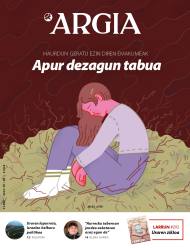Young people, an increasingly reduced vocabulary
“Young people use increasingly reduced vocabulary,” “the youth speak increasingly has more loans,” “young people are less expressive,” “we will soon talk in Spanish thinking that we are talking about Euskera.” I often use this type of assertion in courses organized for teachers. I write on the board and ask the students if they agree, of course most do. Then I tell you: the first one was launched by Konfuzio a. C. 510. The second, Aristotle. 329. The third, Habermas… What I do is a bad plagiarism, because once another teacher did it to us, but I had no phrases, no authors appointed and therefore correct. The last sentence was issued by Lazkao Txiki. The worst thing is, I don't remember or who the professor was and I can't ask for real quotes.
It has always been customary to criticize the language of young people or new generations, believing that “old” was better. In our case, in addition to young people, the newcomers to the language are also very important, as the percentage of Euskaldunes is high. Consequently, more Euskaldunes than ever are more competent in another language. However, the most serious risk is not to “ruin” Euskera, but to give up Euskera.
It has always been customary to criticize the language of young people or new generations, believing that “old” was better
One of the reasons for not using language can be the fear of being wrong. Minority language speakers like ours have an easy getaway, as few criticize for their torpedoes in Spanish, French or English, and have many resources to enrich and adapt language. Because communicative competence is not only acquired in schools, nor in Euskaltegis; it is learned in all areas of life, and lately especially on screens. The hegemonic languages have recorded all kinds of communicative, real or fictitious situations, which allows the speakers to continuously be in direct contact with the language and to work all records. We all receive a huge amount of inputs in Spanish, both in the respiratory areas and in the strictures, with which we are Spanish speakers.
We therefore need audiovisual, cultural, media or real materials. Then, we have to put in front of the spotlights these appropriate and varied oral models and encourage them well so that attractive linguistic forms get through the eyes. That is all we have to do, yes, but above all that habit of criticising languages must end. It's not the time of the Red Boluses, Damn!
Bidali zure iritzi artikuluak iritzia@argia.eus helbide elektronikora
ARGIAk ez du zertan bat etorri artikuluen edukiarekin. Idatzien gehienezko luzera 4.500 karakterekoa da (espazioak barne). Idazkera aldetik gutxieneko zuzentasun bat beharrezkoa da: batetik, ARGIAk ezin du hartu zuzenketa sakona egiteko lanik; bestetik, egitekotan edukia nahi gabe aldatzeko arriskua dago. ARGIAk azaleko zuzenketak edo moldaketak egingo dizkie artikuluei, behar izanez gero.
It is not an easy task to define what the new US mandate will bring in the economic sphere. The axis of the new economic strategy will be the peculiar union between liberalism and protectionism for the external sector. Despite what has happened in the United States on a regular... [+]
The evolution that the Internet has taken over the last 15 years, together with its technological and business model, makes us think that it is a tool to increase the worst aspects of humanity. Around the world, agents have been created that are not satisfied with this idea... [+]
In recent years, I have made little progress. I have said it many times, I know, but just in case. Today I attended a bertsos session. “I wish you a lot.” Yes, that is why I have warned that I leave little, I assume that you are attending many cultural events, and that you... [+]
In 2006, Baltasar Garzón, then star judge, suffered a kind of revelation and drafted a practice that guaranteed the rights of those detained for terrorism. The same judge saw hundreds of incommunicado detainees pass through his room, many with obvious signs of ill-treatment,... [+]
They're one of the most beautiful memories I have in my heart. At the time I was doing Basque Philology and we went to a society in Arbizu to a concert by Ruper Ordorika. There were Rikardo Arrangi Diaz of Heredia and Juanjo Olasgrip. I didn't dare to tell Arrangi that I had in my... [+]
Recently, when asked what the climate emergency consisted of, a scientist gave the excellent answer: “Look, the climate emergency is this, you increasingly see on your mobile more videos related to extreme weather events, and when you realize, it’s you who are recording one... [+]
It is said that Simone de Beauvoir wrote that the oppressor would not be so strong if he did not have complicit in the lines of the oppressed. It seems very normal to me... What do you want? When you're down, it's also understandable that you want to improve your condition, and... [+]
On November 25, International Day against Male Violence, the Steilas Feminist Union Feminist Secretariat has published a poster: Our body is a battlefield, and all the schools in Hego Euskal Herria have received it. We wish to denounce the violence suffered by women and children... [+]
We live in a context in which anti-feminist and racist hate speech at the global level is on the rise. Far-right narratives are inserted throughout the world by
social networks and political agendas. Racism and anti-feminism have become two great discursive axes that adapt to... [+]
Many times, after looking at the brumas from my house, it has occurred to me not to catch umbrellas, even though I know I will just soak up. Why will it be? Maybe you don't want to catch the umbrella? Maybe in the hope that I don't get wet? Nevertheless, the conclusion has always... [+]
I remember when I was 16 years old, the Ertzaintza first identified me in a concentration in favor of the Basque Country before the Bergara courts. We believed that in Euskal Herria it was legitimate to cry for the Euskaldunization of the courts, but then there would also be a... [+]
The disaster caused by the cold drop in Valencia has left us dramatic images, both because of the immediate consequences it has had, and because the future awaiting us has brought us forward: that this type of extreme climate phenomena will be increasingly numerous and serious... [+]
The update of the Navarra Energy Plan goes unnoticed. The Government of Navarre made this public and, at the end of the period for the submission of claims, no government official has explained to us what their proposals are to the citizens.
The reading of the documentation... [+]
Since the disappearance of the Soviet Union, rusophobia has been growing. The concept of security of the UN Security Council of 2002 is very clear and indicates that the security and stability of the planet must depend on the states that do not intend to challenge the United... [+]


















